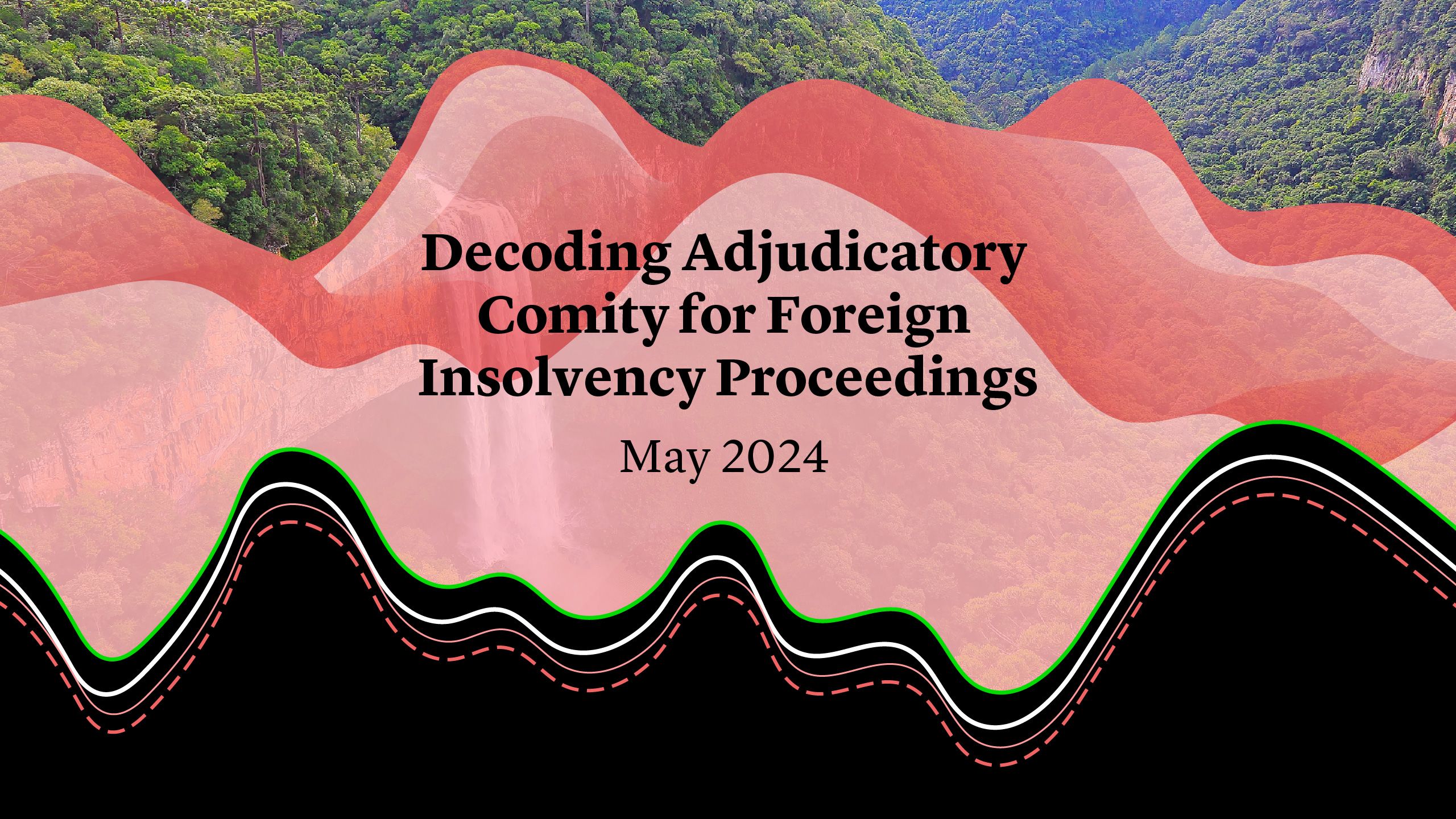
With the rise of multinational corporations and global supply chains, many non-U.S.-based businesses have operations or dealings that touch the U.S. in some manner. As a result, when a non-U.S. company is subject to foreign (i.e., non-U.S.) bankruptcy proceedings, the foreign debtor may simultaneously be faced with concurrent litigation in the U.S. One way in which a foreign debtor can address this issue is to seek recognition of the foreign bankruptcy in the U.S. under Chapter 15 of the Bankruptcy Code, which would have the effect of automatically staying any U.S.-based litigation.
In the absence of Chapter 15 recognition, however, there are still certain circumstances in which a U.S. court will stay or dismiss litigation against a foreign debtor, in deference to the foreign bankruptcy proceedings, under the doctrine of adjudicatory comity. But the question of when a U.S. court will apply this doctrine is difficult, requires a multi-factor analysis, and U.S. courts have not been uniform in their approach. These issues came to a head in a recent case before the U.S. Court of Appeals for the Third Circuit (the “Third Circuit”), Vertiv Inc. v. Wayne Burt PTE1, in which the Third Circuit clarified the test for the application of adjudicatory comity in deference to foreign bankruptcy proceedings, providing important guidance to foreign debtors as to when they may be able to obtain a dismissal or stay of U.S. litigation in the absence of Chapter 15 recognition.


With the rise of multinational corporations and global supply chains, many non-U.S.-based businesses have operations or dealings that touch the U.S. in some manner. As a result, when a non-U.S. company is subject to foreign (i.e., non-U.S.) bankruptcy proceedings, the foreign debtor may simultaneously be faced with concurrent litigation in the U.S. One way in which a foreign debtor can address this issue is to seek recognition of the foreign bankruptcy in the U.S. under Chapter 15 of the Bankruptcy Code, which would have the effect of automatically staying any U.S.-based litigation.
In the absence of Chapter 15 recognition, however, there are still certain circumstances in which a U.S. court will stay or dismiss litigation against a foreign debtor, in deference to the foreign bankruptcy proceedings, under the doctrine of adjudicatory comity. But the question of when a U.S. court will apply this doctrine is difficult, requires a multi-factor analysis, and U.S. courts have not been uniform in their approach. These issues came to a head in a recent case before the U.S. Court of Appeals for the Third Circuit (the “Third Circuit”), Vertiv Inc. v. Wayne Burt PTE1, in which the Third Circuit clarified the test for the application of adjudicatory comity in deference to foreign bankruptcy proceedings, providing important guidance to foreign debtors as to when they may be able to obtain a dismissal or stay of U.S. litigation in the absence of Chapter 15 recognition.
Setting the Stage: Dynamics of U.S. Courts and Foreign Bankruptcy
Congress has long sought to regulate the interplay between foreign and domestic court proceedings in the bankruptcy context: first, in the now-repealed Section 304 of the Bankruptcy Code, enacted in 19782, and more recently in Chapter 15 of the Bankruptcy Code, enacted in 20053. Chapter 15, which is based on the U.N. Commission on International Trade Law’s Model Law on Cross Border Insolvency, allows U.S. courts to formally recognize a foreign bankruptcy proceeding. Importantly, upon recognition of a foreign insolvency proceeding as a main proceeding, judicial proceedings in the U.S. against the debtor are generally automatically stayed, with some exceptions4.
Although foreign debtors have increasingly used Chapter 15 proceedings to protect themselves against U.S.-based litigation, there are times, even absent of a Chapter 15 filing, when foreign debtors may need to request that a U.S. court defer to a foreign restructuring and stay or dismiss (without prejudice) domestic actions commenced by U.S. creditors against the foreign debtor. To put meat on the bones of such a request, foreign debtors invoke the doctrine of comity.
Comity, in general, “is the recognition which one nation allows within its territory to the legislative, executive or judicial acts of another nation”5. The first type, prescriptive comity, addresses whether a particular statute regulates conduct occurring overseas and involves courts asking whether they should “presume that Congress, out of respect for foreign sovereigns, limited the application of domestic law on a given set of facts”6. Foreign debtors who have not sought Chapter 15 protection but who wish to enjoin U.S.-based litigation in favor of a foreign bankruptcy proceeding must invoke the second type, adjudicatory (or adjudicative) comity, in order to do so7. This type of comity is invoked when a U.S. court must decide whether to defer to the acts of foreign courts8. In performing an adjudicatory comity analysis, a court “asks whether, where a statute might otherwise apply, a court should nonetheless abstain from exercising jurisdiction in deference to a foreign nation’s courts that might be a more appropriate forum for adjudicating the matter”9. This question long predates Section 304 or Chapter 1510, and has been applied in many contexts in the absence of express direction from Congress11.
Although the doctrine is old, since the enactment of Chapter 15, U.S. courts have not unanimously applied adjudicatory comity to foreign bankruptcy proceedings, with some holding that the absence of a Chapter 15 filing bars the granting of deference to the overseas court12. Others, however, have applied the doctrine and have stayed or dismissed domestic proceedings in favor of a foreign bankruptcy, even without a Chapter 15 recognition13.


Setting the Stage: Dynamics of U.S. Courts and Foreign Bankruptcy
Congress has long sought to regulate the interplay between foreign and domestic court proceedings in the bankruptcy context: first, in the now-repealed Section 304 of the Bankruptcy Code, enacted in 19782, and more recently in Chapter 15 of the Bankruptcy Code, enacted in 20053. Chapter 15, which is based on the U.N. Commission on International Trade Law’s Model Law on Cross Border Insolvency, allows U.S. courts to formally recognize a foreign bankruptcy proceeding. Importantly, upon recognition of a foreign insolvency proceeding as a main proceeding, judicial proceedings in the U.S. against the debtor are generally automatically stayed, with some exceptions4.
Although foreign debtors have increasingly used Chapter 15 proceedings to protect themselves against U.S.-based litigation, there are times, even absent of a Chapter 15 filing, when foreign debtors may need to request that a U.S. court defer to a foreign restructuring and stay or dismiss (without prejudice) domestic actions commenced by U.S. creditors against the foreign debtor. To put meat on the bones of such a request, foreign debtors invoke the doctrine of comity.
Comity, in general, “is the recognition which one nation allows within its territory to the legislative, executive or judicial acts of another nation”5. The first type, prescriptive comity, addresses whether a particular statute regulates conduct occurring overseas and involves courts asking whether they should “presume that Congress, out of respect for foreign sovereigns, limited the application of domestic law on a given set of facts”6. Foreign debtors who have not sought Chapter 15 protection but who wish to enjoin U.S.-based litigation in favor of a foreign bankruptcy proceeding must invoke the second type, adjudicatory (or adjudicative) comity, in order to do so7. This type of comity is invoked when a U.S. court must decide whether to defer to the acts of foreign courts8. In performing an adjudicatory comity analysis, a court “asks whether, where a statute might otherwise apply, a court should nonetheless abstain from exercising jurisdiction in deference to a foreign nation’s courts that might be a more appropriate forum for adjudicating the matter”9. This question long predates Section 304 or Chapter 1510, and has been applied in many contexts in the absence of express direction from Congress11.
Although the doctrine is old, since the enactment of Chapter 15, U.S. courts have not unanimously applied adjudicatory comity to foreign bankruptcy proceedings, with some holding that the absence of a Chapter 15 filing bars the granting of deference to the overseas court12. Others, however, have applied the doctrine and have stayed or dismissed domestic proceedings in favor of a foreign bankruptcy, even without a Chapter 15 recognition13.


The Third Circuit’s Refreshed Test for Adjudicatory Comity
Vertiv concerned a breach-of-contract dispute between Delaware-incorporated and New Jersey-based Vertiv, Inc., Vertiv Capital, Inc., and Gnaritis, Inc. (together, “Vertiv”) and Wayne Burt, PTE Ltd. (“Wayne Burt”), a Singaporean company undergoing concurrent liquidation proceedings in Singapore (which are analogous to bankruptcy proceedings in the U.S.). In January and September 2020 respectively, Vertiv filed two separate actions against Wayne Burt in the U.S. District Court for the District of New Jersey (the “District Court”). In both actions, Vertiv alleged that Wayne Burt had defaulted on a loan and owed Vertiv the full value of the principal and interest due on the loan, as well as certain shares of a separate company (Cetex Petrochemicals Ltd) that Wayne Burt had pledged as collateral to secure the loan. Both actions were identical, other than the identity of one of Wayne Burt’s co-defendants.
Shortly after both actions were filed, the parties agreed to, and the District Court entered, two consent judgments in favor of Vertiv, which had ostensibly been approved by one of Wayne Burt’s directors. In July 2021, however, the District Court learned for the first time that Wayne Burt was undergoing liquidation proceedings in Singapore and vacated the consent judgments after the Singaporean court-appointed Liquidator for Wayne Burt filed motions to vacate under Federal Rule of Civil Procedure 60(b). The Liquidator asserted that the officers who purportedly consented to the judgments in the District Court lacked the authority to do so because, under Singaporean law, only the Liquidator had the authority to act on Wayne Burt’s behalf, that the Liquidator did not have notice of the proceedings at the time the judgments were entered, and that the loans underlying the judgments in the District Court never existed14.
Subsequently, Vertiv’s actions against Wayne Burt were consolidated, and Vertiv filed an amended complaint in September 2021. In November 2021, Wayne Burt (through the Liquidator) moved to dismiss the amended complaint based on, inter alia, international comity in deference to the ongoing Singaporean liquidation proceedings15. The District Court granted the motion and dismissed the amended complaint with prejudice, holding that extending comity to the Singaporean proceedings was appropriate16.
In reaching its decision, the District Court analyzed international comity under two distinct multi-factor tests put forward by the parties. The first was a four-factor test articulated by the District Court in Austar International, Ltd. v. AustarPharma LLC. The second was the Third Circuit’s two-factor test articulated in Philadelphia Gear Corp. v. Philadelphia Gear de Mexico, S.A. The District Court held that the extension of comity was warranted under either test.

On appeal, the Third Circuit vacated the District Court’s decision and set forth a “refreshed” test for analyzing the extension of international comity in favor of foreign bankruptcy proceedings, after noting that it “has been nearly three decades since we addressed this topic, and updated guidance is warranted”17. Interestingly, under this newly articulated test, the presence or absence of Chapter 15 recognition proceedings is not a factor. Rather, as a threshold matter, a court must first determine whether foreign bankruptcy proceedings are “parallel” to a civil action in a U.S. court18.
After a finding of parallelism, the party seeking the extension of comity must make its prima facie case, which requires showing that the foreign bankruptcy law: (1) shares the policy of equal distribution of assets, and (2) mandates or authorizes the request for a stay20. Finally, upon finding that a prima facie case has been made, the court must make a number of additional non-exhaustive inquiries regarding the foreign bankruptcy’s “fairness to the parties and compatibility with U.S. public policy preferences”, including:


On appeal, the Third Circuit vacated the District Court’s decision and set forth a “refreshed” test for analyzing the extension of international comity in favor of foreign bankruptcy proceedings, after noting that it “has been nearly three decades since we addressed this topic, and updated guidance is warranted”17. Interestingly, under this newly articulated test, the presence or absence of Chapter 15 recognition proceedings is not a factor. Rather, as a threshold matter, a court must first determine whether foreign bankruptcy proceedings are “parallel” to a civil action in a U.S. court18.
After a finding of parallelism, the party seeking the extension of comity must make its prima facie case, which requires showing that the foreign bankruptcy law: (1) shares the policy of equal distribution of assets, and (2) mandates or authorizes the request for a stay20. Finally, upon finding that a prima facie case has been made, the court must make a number of additional non-exhaustive inquiries regarding the foreign bankruptcy’s “fairness to the parties and compatibility with U.S. public policy preferences”, including:
Turning back to the appeal before it, the Third Circuit noted that the District Court had correctly concluded that the U.S. and Singaporean proceedings were parallel, and that Wayne Burt had made its prima facie case for the extension of comity in favor of the Singaporean liquidation proceedings. However, the District Court stopped there and did not analyze the remainder of the test. Accordingly, the Third Circuit vacated the District Court’s decision and remanded the case in order for the District Court to complete its analysis23.

Closing Insights
Following Vertiv, foreign debtors can take some comfort in the fact that (at least in the Third Circuit) Chapter 15 recognition of foreign insolvency proceedings, and the application of the automatic stay that comes with such recognition, is not always required in order for a foreign debtor or its representatives in a foreign bankruptcy proceeding to obtain a stay or dismissal of a concurrent action commenced by a creditor against the debtor in the U.S. Further, in certain circumstances, the Third Circuit’s new guidance on the application of adjudicatory comity in deference to foreign bankruptcy proceedings may counsel in favor of a foreign debtor foregoing seeking Chapter 15 recognition, whether to avoid the cost of seeking Chapter 15 recognition or for other reasons. On the other hand, however, taking such an approach is not without risk for a foreign debtor in light of the relatively complex multi-factor test propounded by the Third Circuit in Vertiv. The practical reality is that multi-factor tests such as this heighten the risk for error or divergent results at the lower court level. Foreign debtors should weigh these costs and benefits before deciding how to proceed.

Closing Insights
Following Vertiv, foreign debtors can take some comfort in the fact that (at least in the Third Circuit) Chapter 15 recognition of foreign insolvency proceedings, and the application of the automatic stay that comes with such recognition, is not always required in order for a foreign debtor or its representatives in a foreign bankruptcy proceeding to obtain a stay or dismissal of a concurrent action commenced by a creditor against the debtor in the U.S. Further, in certain circumstances, the Third Circuit’s new guidance on the application of adjudicatory comity in deference to foreign bankruptcy proceedings may counsel in favor of a foreign debtor foregoing seeking Chapter 15 recognition, whether to avoid the cost of seeking Chapter 15 recognition or for other reasons. On the other hand, however, taking such an approach is not without risk for a foreign debtor in light of the relatively complex multi-factor test propounded by the Third Circuit in Vertiv. The practical reality is that multi-factor tests such as this heighten the risk for error or divergent results at the lower court level. Foreign debtors should weigh these costs and benefits before deciding how to proceed.






